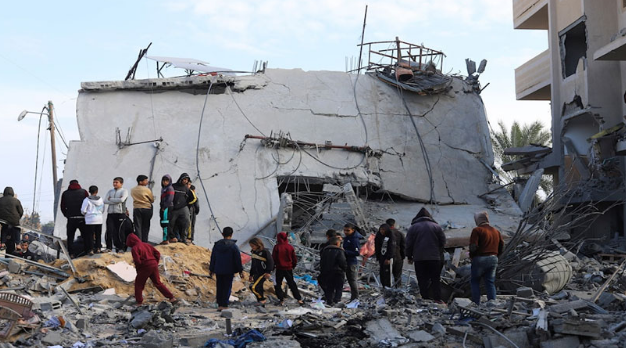New York (Web Desk): The ongoing conflict in Gaza has led to a devastating collapse of essential services that are vital for survival, particularly healthcare, emergency aid, and humanitarian access.
The United Nations (UN) and humanitarian organizations have raised alarms about the worsening conditions, which have become increasingly dire due to the systematic destruction of medical facilities and the blocking of critical aid.
A recent example of this escalation is the destruction of the Kamal Adwan Hospital in North Gaza. On December 27, Israeli forces raided the hospital, forcibly evacuating patients and staff, and detaining the hospital's director.
The raid left the hospital inoperable, compounding the already severe strain on Gaza’s healthcare system.
The patients who were transferred to another hospital, the Indonesian Hospital, were not much better off.
The Indonesian Hospital has since ceased functioning due to shortages of water, electricity, and sanitation, forcing patients into increasingly hazardous conditions.
The situation is made even more tragic by the arrest of four patients at a checkpoint, leaving the remaining seven patients and their caregivers stranded in desperate conditions.
Humanitarian efforts to address the widespread suffering have faced major hurdles. Over the past months, more than 150 attempts to deliver aid to North Gaza have been blocked by Israeli authorities. Even missions that were initially granted approval have been severely delayed, further exacerbating the situation.
While some aid did reach survivors in late December, delivering basic medical supplies, food, and water, the overall response remains inadequate to meet the growing needs of the population.
Adding to the crisis, armed groups have looted several aid convoys in southern Gaza, with reports of dozens of truckloads of supplies being stolen.
These incidents not only reduce the availability of life-saving aid but also place humanitarian workers in grave danger, preventing them from carrying out their missions with the necessary safety.
Furthermore, the ongoing Israeli blockade of Gaza continues to cripple the delivery of goods, including food, medicine, and other essential supplies, leaving families increasingly vulnerable as winter sets in.
The UN has urgently called for unrestricted access to humanitarian aid and the protection of civilians, emphasizing that humanitarian principles must be respected to prevent further suffering.
With millions of people in Gaza and the West Bank relying on external support, the international community faces a critical moment to act swiftly and ensure the survival and dignity of the most vulnerable populations.
As the crisis deepens, the lack of sufficient aid and the ongoing violence have left the region on the brink of further catastrophe, with no immediate solution in sight.


